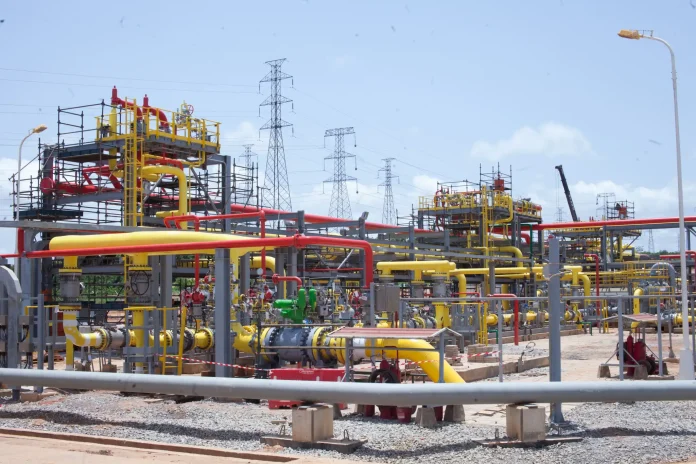Ghana National Gas Limited is promising a sharper, more disciplined approach in 2025 after what Board Chairman Kofi Totobi Quakyi described as a defining yet challenging 2024. Speaking at the company’s recently concluded Annual General Meeting, Totobi Quakyi acknowledged that last year tested the state-owned enterprise in ways that demanded honest reflection and strategic recalibration.
The commitment to “greater discipline” signals that 2024 wasn’t entirely smooth sailing for Ghana Gas, though Totobi Quakyi balanced his assessment by noting strong operational performance alongside the challenges. That duality captures the complexity facing Ghana’s gas sector, where technical achievements often coexist with governance and financial pressures that can undermine even solid operational work.
Totobi Quakyi assumed the board chairmanship in May 2025 following his appointment by President John Dramani Mahama, bringing decades of public service experience to a role that demands both political savvy and technical understanding. His background as former Minister for Information and National Security under the Rawlings administration gives him institutional knowledge that could prove valuable as Ghana Gas navigates an evolving energy landscape.
The emphasis on productivity, accountability, and integrity at the AGM reflects themes that resonate across Ghana’s state-owned enterprises, many of which have struggled with operational efficiency and financial sustainability. Ghana Gas operates critical infrastructure that processes natural gas from offshore fields and distributes it to power plants and industrial users, making its performance essential to Ghana’s broader energy security and economic stability.
What makes this particular pledge noteworthy is its timing. Ghana Gas has been operating under relatively new board leadership since the Mahama administration reconstituted its governance structure earlier this year. The reconstituted board includes notable figures like former Electoral Commission Chairperson Charlotte Osei, suggesting that government wants diverse perspectives guiding the company’s strategic direction.
The “lessons from 2024” language invites questions about what specifically went wrong or fell short of expectations. State-owned enterprises in Ghana often face challenges ranging from political interference to cash flow constraints, delayed payments from government entities, and infrastructure maintenance issues. Without more specifics from Totobi Quakyi’s remarks, it’s difficult to pinpoint which particular lessons he’s referencing, but the acknowledgment itself represents a degree of transparency that hasn’t always characterized state enterprise communications.
Ghana’s natural gas sector operates at the intersection of technical operations and political economy. The country produces gas primarily from offshore fields including Jubilee, TEN, and Sankofa, with Ghana Gas responsible for processing and distributing that supply. Any disruptions or inefficiencies at Ghana Gas ripple through the entire energy value chain, affecting electricity generation, industrial production, and ultimately economic growth.
The commitment to accountability and integrity addresses perennial concerns about governance at state-owned enterprises. Ghanaians have grown accustomed to promises of improved governance at these institutions, often with mixed results. The test for Totobi Quakyi’s leadership will be whether 2025 brings measurable improvements in operational metrics, financial performance, and stakeholder satisfaction, or whether the AGM rhetoric fails to translate into tangible change.
Sustainable growth, another pillar of Ghana Gas’s stated transformation agenda, requires careful balancing of commercial viability with public service obligations. As a state-owned company, Ghana Gas must generate sufficient revenue to maintain operations and infrastructure while also ensuring that gas pricing doesn’t become politically contentious or economically disruptive. That balancing act has challenged utility companies across Africa, where subsidies, non-payment, and pricing disputes frequently undermine financial sustainability.
The energy sector’s importance to Ghana’s development trajectory means that Ghana Gas’s performance matters beyond narrow corporate metrics. Reliable, affordable natural gas supply enables manufacturing competitiveness, reduces reliance on more expensive energy sources, and supports job creation across industries that depend on stable power. When Ghana Gas functions efficiently, it creates positive externalities throughout the economy; when it stumbles, the consequences extend far beyond the company’s balance sheet.
Totobi Quakyi’s experience in government could help him navigate relationships with key stakeholders including the Ministry of Energy, the Public Utilities Regulatory Commission, power generation companies, and industrial consumers. Those relationships often determine how effectively state enterprises can implement reforms and respond to operational challenges without getting entangled in bureaucratic delays or political complications.
The board’s composition, which includes professionals from various backgrounds, suggests an attempt to bring multidisciplinary expertise to Ghana Gas’s governance. That diversity could strengthen decision making if the board functions cohesively, though it could also create friction if members bring conflicting priorities or philosophies about how state enterprises should operate.
What remains to be seen is whether Ghana Gas’s 2025 performance will validate the optimism expressed at the AGM. Commitments to transformation and discipline are relatively easy to articulate; implementing them consistently across a complex organization operating critical infrastructure is considerably harder. The company will need to demonstrate concrete improvements in areas like operational efficiency, financial management, customer service, and infrastructure reliability to convince skeptics that this represents genuine transformation rather than familiar promises.
For Ghanaians who depend on stable energy supply, the stakes extend beyond corporate governance abstractions. They want affordable electricity, they want industries that can compete regionally because of reliable power, and they want assurance that state-owned enterprises are managed competently rather than becoming sources of fiscal drain or service disruption. Ghana Gas’s ability to deliver on those expectations will ultimately determine whether 2025 represents the disciplined, productive year that Totobi Quakyi envisions.
Source: newsghana.com.gh











